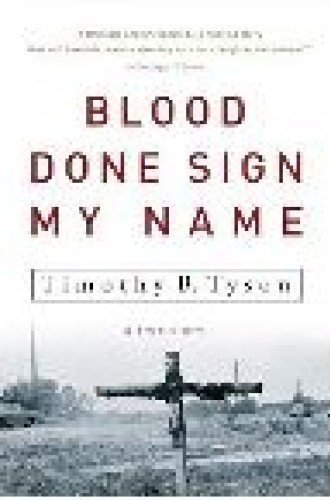Blood Done Sign My Name
On a summer day in 1970, ten-year-old Tim Tyson was playing with his neighborhood friend, Gerald Teel, when Gerald whispered to him, “Daddy and Roger and ’em shot a nigger.” That murder set in motion a racial conflict that rocked the small tobacco town of Oxford, North Carolina.
Timothy B. Tyson, professor of Afro-American studies at the University of Wisconsin at Madison, offers more than a personal account of the events surrounding the murder of Henry “Dickie” Marrow, 23, a black military veteran. His book is also a candid examination of the African-American struggle for freedom.
Until the aftermath of Marrow’s murder, Oxford had been almost untouched by the civil rights movement. Murder charges were leveled at Robert Teel—who had a criminal record and ties to the Ku Klux Klan—and at two of his sons. When an all-white jury acquitted the Teels of all charges, a group of black Vietnam veterans organized mass protests and a march on the state capital. Demonstrators burned down Oxford’s tobacco warehouses, which represented the heart of its economy. The white establishment called in reinforcements.
At the time, Tim Tyson’s father was the ambitious young pastor of the First Methodist Church of Oxford. With large sections of the town destroyed, Vernon Tyson pressed his congregation to reach across racial barriers and come to terms with the town’s racial history. But such an appeal was too incendiary for his all-white church, which thought the Tyson family was betraying southern honor. The bishop transferred Tyson to another church.
Thirty years later, Tim Tyson returned to North Carolina to try to make sense of the events that had changed his life and compelled him, after a long period of rebellion and dissolute living, to earn a Ph.D. in Afro-American studies. He interviewed Robert Teel, who told him, “That nigger committed suicide, coming in here wanting to four-letter-word my daughter-in-law.” He also talked extensively with black radicals, who understood the power of money and greed to prevent change, and with the former mayor, who admitted that he and the police had made mistakes in trying to quell the riots.
The strength of the book is that Tyson not only paints a conscience-ridden picture of Oxford but also examines the policies of “gradualism” in racial matters. “Gradualism nearly always rested on empty promises; ‘later’ always meant never.”
As in his earlier book, Radio Free Dixie: Robert F. Williams and the Roots of Black Power, Tyson sketches with humor and insight southern characters who questioned the status quo. One such person was Thad Stem, a kind of legendary figure in Oxford and the one man who challenged Pastor Tyson to risk his career and his ambition for the sake of justice and truth.
In his own way, Tim Tyson has continued in his father’s tradition by reaching across barriers—in this case the barriers of time and place—to examine a tragic chapter of U.S. history.





